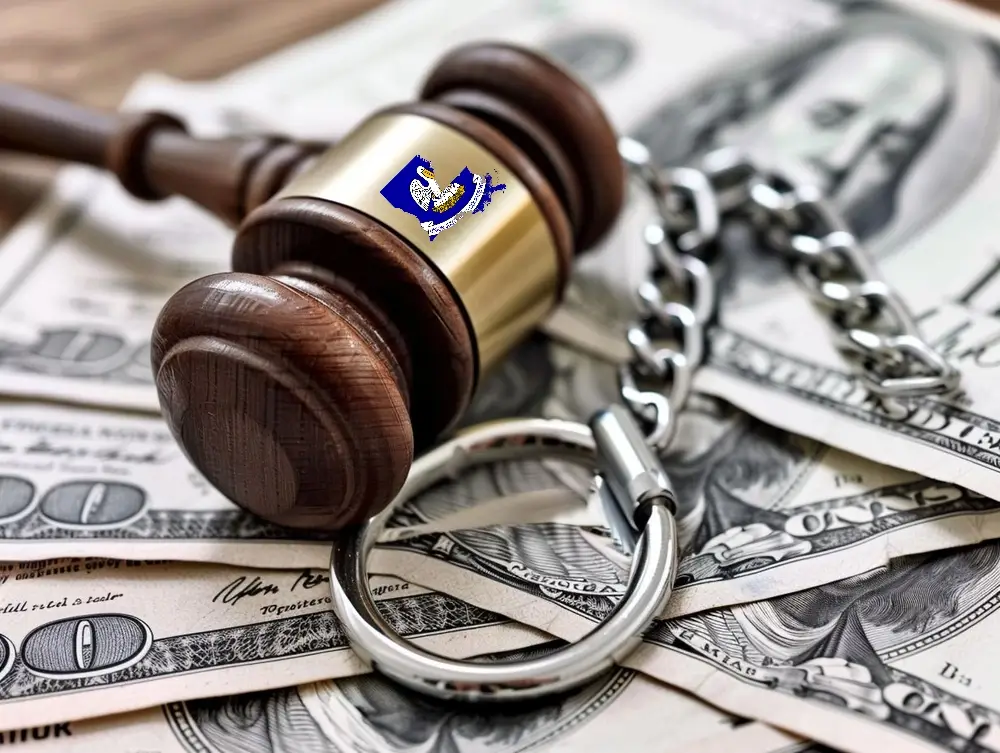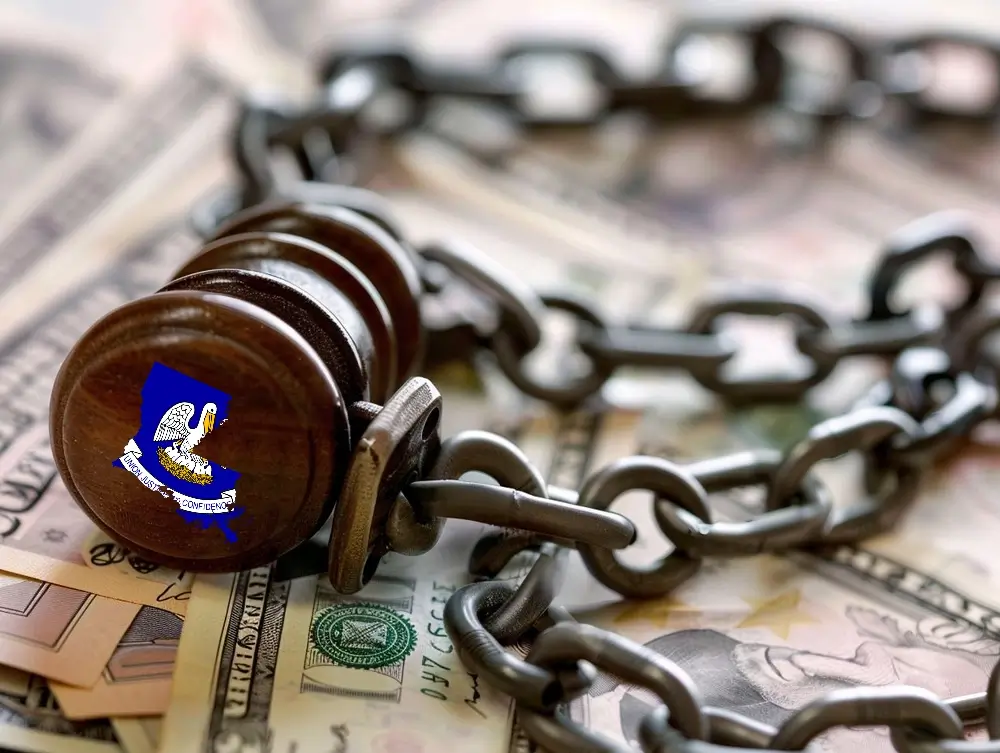In the case that you or a loved one are in need of being released from jail on bail, there are a few things that you should know about how bail bonds work in Louisiana. However, before we get into the details of how bail bonds work in Louisiana and the process you are certain to go through, let’s start with the basics of bail
How Bail Bonds Work will help you get up to date information of bail refund policies, collateral prerequisites, and the significance of seeking counsel from a seasoned New Orleans bail bonds professional.
Key Takeaways of Louisiana Bail Bonds Service:

- Bail bonds in Louisiana follow a specific process that involves consultation with a bail bonds expert and potential collateral requirements.
- Bail financing and bail bond loans are easily accessible in Louisiana, we show you how to get the cheapest Louisiana bail.
- Failure to appear in court or pay fees can result in serious consequences, including revocation of bail bonds.
- Louisiana bail bonds offer options for legal representation in various areas of law, including criminal defense and family law.
How Bail Bonds Work in Louisiana
In Louisiana, bail bonds play a crucial role in the criminal justice system by offering defendants the chance to secure their release from incarceration pending court appearances. This process is commonly overseen by proficient bondsmen who possess the expertise to navigate the intricate legal framework and assist in the management of associated fees and conditions.
Understanding the Bail Bond Process
A firm grasp of the Louisiana bail bonds process is essential for defendants seeking to secure their release from custody, as it encompasses various legal procedures and requires the intervention of a licensed bondsman.
Upon the apprehension of a defendant, they may be presented with the option of posting bail to secure their pre-trial release. The bail sum is determined by the seriousness of the alleged offense and the defendant’s perceived likelihood of evading legal proceedings.
In situations where the defendant lacks the financial means to pay the entire bail amount upfront, they may opt to engage the services of a bail bondsman. The bondsman typically assesses a non-refundable fee, often equivalent to approximately 10% of the bail figure, and pledges the remaining amount using collateral. By engaging a bail bond service, the defendant commits to meeting all court requirements and attending all scheduled court appearances.
Failure to Appear in Court
Non-compliance with a court appearance can have significant repercussions for the defendant, including the issuance of an arrest warrant and potential forfeiture of the bail bond.
Failure to appear in court by the defendant is considered a violation of the legal process, resulting in grave consequences. The court reserves the right to issue a bench warrant for the individual’s arrest, permitting law enforcement to apprehend and present them before the court. This action may give rise to additional charges and complexities in the defendant’s legal proceedings.
The bail bond, whether posted by a surety or the defendant, may face forfeiture, leading to financial losses and exacerbating legal entanglements. It is imperative for individuals with pending court appearances to adhere to judicial directives to avert such adverse outcomes.
Refunds for Bail Bonds
There are no refunds for commercial Louisiana bail bonds. The only time you will get your money back is if you paid the court 100% of the cash bail. Even then your refund may have court fees, fines, jail charges withheld.
If a defendant successfully attends all scheduled court dates and fulfills any other mandates established by the court, such as undergoing a rehabilitation program or completing community service, they may qualify for a reimbursement of their bail bond expenses. The court will undertake a comprehensive assessment of the case to ascertain whether the conditions for a refund have been satisfied. It is imperative that defendants adhere meticulously to all court directives and commitments in order to heighten the likelihood of being refunded for their bail bond.
Collateral Requirements

The requirements for collateral in bail bonds frequently encompass property bonds or other valuable assets that the defendant or their family must furnish to secure the bond. Property bonds, which entail utilizing real estate as collateral, represent a prevalent form of security within the bail bond procedure. Additionally, depending on the bond amount and the policies set forth by the bail bondsman, cash, jewelry, or vehicles may be deemed acceptable as collateral.
When offering collateral for a bail bond, the defendant or their family assumes the responsibility of ensuring the defendant’s appearance in court as stipulated. Failure to adhere to this obligation may lead to the forfeiture of the collateral and subsequent legal repercussions.
Consequences of Failure to Pay Fees
Failure to remit the required fees for a bail bond may lead to significant legal repercussions, including the forfeiture of the bail bond and subsequent rearrest of the individual in question.
Adherence to the financial obligations associated with a bail bond is imperative to facilitate a seamless progression of the legal proceedings. Timely payment not only reinforces the trust vested in the defendant by the court but also signifies a dedication to fulfilling legal duties.
Neglecting these financial commitments can engender complications within the legal process, potentially culminating in supplementary charges or impediments in addressing the underlying legal matters. Consequently, it is imperative for parties involved in bail bonds to prioritize the fulfillment of these financial responsibilities to avert adverse consequences.

Revocation of Bail Bonds
Revocation of bail bonds is a possible consequence if the defendant breaches the terms of the bond, such as missing court appearances or failing a drug test. Plus these violations, other circumstances that may result in the revocation of a bail bond include committing new offenses while on bail, tampering with evidence, contacting victims or witnesses against court orders, or leaving the jurisdiction without permission.
It is imperative for the defendant to adhere to all court-mandated responsibilities, which may encompass attending all court hearings, abiding by any travel restrictions, refraining from illegal activities, and complying with any other specific conditions stipulated by the court.
Consultation with a Bail Bonds Expert
Seeking consultation from a bail bonds expert can offer defendants essential legal advice and support in navigating the bail bond process to ensure adherence to all legal prerequisites. These professionals specialize in guiding individuals through the intricacies of the justice system, aiding in the comprehension of their rights and responsibilities concerning bail.
Through collaboration with a bail bonds expert, defendants can acquire insights into the various avenues for securing their release, such as surety bonds or property bonds. By leveraging the expertise of these professionals, individuals can streamline the bail process, thereby saving time and alleviating potential stress while awaiting trial. Furthermore, they provide valuable assistance in managing requisite paperwork and ensuring comprehensive understanding and compliance with all agreements.
Free Consultation Offer
Many bail bondsmen offer a complimentary consultation to engage in dialogue with the defendant regarding their case and elucidate the intricacies of the bail bond process, providing valuable legal guidance without an initial fee.
Throughout these consultations, defendants can anticipate gaining insight into the responsibilities linked to being out on bail, the prerequisites that must be fulfilled, and the potential repercussions of failing to adhere to the conditions.
Proactively seeking legal advice not only enables defendants to comprehend their entitlements and alternatives but also enables them to formulate a robust defense strategy from the inception, thereby enhancing their prospects of a favorable resolution in court.
Availing themselves of these complimentary consultations can ultimately result in time and cost savings for defendants by assisting them in making well-informed decisions concerning their legal predicament.
Legal Representation Options
Defendants in bail bond cases have various legal representation options available to them, including retaining the services of a criminal defense attorney to offer expert guidance and representation in court. These attorneys specialize in navigating the intricate pathways of the legal system, ensuring the protection of the defendant’s rights and their fair treatment during trial proceedings.
The selection of an appropriate attorney is of paramount importance, given that their experience and proficiency can profoundly impact the case’s outcome. A competent defense attorney will meticulously scrutinize the charges, compile evidence, and formulate a robust defense strategy for presentation in court. Their adept understanding of the law and court protocols can significantly enhance the likelihood of securing a favorable outcome for the defendant.
Immigration Bail Bonds

Immigration bail bonds are crafted with the specific purpose of facilitating the release of individuals entangled in legal matters concerning immigration, often necessitating strict adherence to predetermined bond conditions. These bonds act as a form of assurance that the individual in question will attend all court proceedings linked to their immigration case.
The process of securing an immigration bail bond entails the cooperation of a bail bondsman, whose role involves evaluating the defendant’s eligibility and potential risk of flight. Mandatory conditions may encompass consistent reporting to immigration authorities, attendance at all pre-scheduled court hearings, and compliance with any deportation directives that may be issued. Failure to adhere to these conditions can lead to the rescinding of the bond and the subsequent re-incarceration of the defendant.
Criminal Defense Bail Bonds
Criminal defense bail bonds serve the purpose of securing the release of individuals facing criminal charges, in conjunction with legal representation to guide them through the legal proceedings and court appearances.
The significance of criminal defense bail bonds lies in enabling individuals to attain release from custody as their case traverses through the legal system. Collaborating closely with legal counsel is imperative to ensure the safeguarding of the defendant’s rights and thorough exploration of all legal options for a successful defense.
The acquisition of a bail bond entails the provision of collateral or a fee to a bail bondsman, who subsequently undertakes the posting of the bond on behalf of the defendant. This intricate process necessitates transparency, trust, and a high level of expertise to navigate it effectively.
Family Law Bail Bonds
Family law bail bonds are utilized in legal situations related to family matters, enabling defendants to secure their release from court custody while legal proceedings are ongoing. These bonds function as a financial guarantee that the defendant will appear in court as required until the case reaches resolution. In family law cases, where emotions can run high, the presence of a bail bond can help alleviate stress and uncertainty for all parties involved.
An experienced attorney plays a pivotal role in navigating the complexities of bail bonds, ensuring that the defendant fulfills all court appearances and legal obligations. Attorneys collaborate closely with bail bond agents to oversee the defendant’s compliance and address any issues that may arise during the legal process.
How to become a Louisiana Bail Bondsman
You must fill out an application and once approved need to take an exam. The Louisiana bail bondsman licensing handbook is a good place to start for more information about bail bonding in Louisiana.
Frequently Asked Questions about Louisiana Bail Bonds
How do bail bonds work in Louisiana?
In Louisiana, bail bonds are used to secure an individual’s release from jail while awaiting trial. A bail bond is a financial guarantee that the defendant will appear in court for all scheduled hearings.
What is the process for obtaining a bail bond in Louisiana?
To obtain a bail bond in Louisiana, you will need to work with a licensed bail bond agent. The agent will require you to pay a non-refundable percentage of the total bond amount and may also require collateral. Once the paperwork and payment are complete, the agent will post the bond and the defendant will be released from jail.
Can I get a bail bond loan in Louisiana?
Yes, there are bail bond loans available in Louisiana for those who cannot afford the full cost of the bond. These loans require a down payment and monthly payments until the full amount is paid off. It is important to note that personal loans may have high interest rates, but bail bond loans through a bondsman will have zero interest rates.
What happens if the defendant fails to appear in court?
If the defendant fails to appear in court, the bail bond will be forfeited and the bail bond agent may come after the defendant for the full amount of the bond. The defendant may also face additional charges for failing to appear in court
Are there any restrictions on who can post bail for a defendant in Louisiana?
Yes, in Louisiana, anyone who has been charged with a crime cannot post bail for another defendant. Additionally, those who are on probation or parole cannot post bail for a defendant.
What happens to the bail bond once the case is resolved?
Once the case is resolved, the bail bond will be exonerated and any collateral will be returned to the person who posted it. The bail bond agent will also receive their percentage of the bond amount as payment for their services.
Do I get my bail money back when the case is over?
No. The money you spent hiring a bail bondsman is non-refundable. Paying only 10% of the bond helped to save you 90%
If my bail is $10,000 how much do I pay the bondsman?
Bail in Louisiana is 10% of the cash bond. If your bond was $10,000 then expect to pay the bondsman $1,000.
